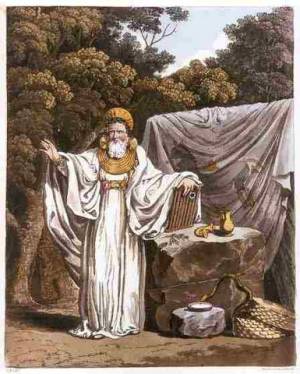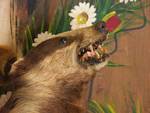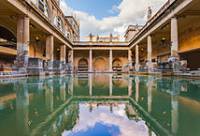Druidism
The druids were the ancient priestly class of the Celts. They took upon themselves the role of relating to the Gods upon behalf of their people, thanking them for their benevolence or bringing down their wrath as the situation warranted. Famed for their innate understanding of nature, they have been cast as archetypal nature worshippers, though this is far from the truth in most cases — unless such is demanded by the local God. It is said that the Celtic Gods loved their internal politics, and their downfall against Christianity may have had more to do with their incessant squabbling than any advantage Christendom had to bring.
Many Druidic remnants still persist in the wilder areas of Scotland, Wales, Cornwall and the northern parts of France.
The Celtic Gods are still worshipped because they are the gods closest tied to England, Scotland and Wales. Unlike the gods of the Angles, who still have followers overseas, or the Christian Saints, who can go to any country where Christianity flourishes, the Celtic Gods have no other homes. Their fortunes are directly linked with their countries, and they will fight longer than any others for their lands and their people. When all else has failed, the Celtic Gods have traditionally been the last hope of the people.
Priests
Someone inducted into the priesthood was seen as set apart from the rest of society, though still an essential part of it. It is said that nothing can be done in a Druidic community without the involvement or at least blessing of the druids. Acting as advisers rather than leaders, it is asserted by many that the druids ran the Celtic tribes from the shadows in the hopes of pleasing their Gods. Some tales tell of intrigue and competition between those druids who had chosen to dedicate themselves to a particular God.
Worship
 It is said that Celtic Gods vie constantly for power among themselves, and those followers who help them obtain it by winning the hearts, minds and sacrifice of their communities are rewarded for their efforts. It is also said that to ignore a Celtic God completely is to invite their wrath. Thusly one might conclude that Druids had to walk a very fine line for their power.
It is said that Celtic Gods vie constantly for power among themselves, and those followers who help them obtain it by winning the hearts, minds and sacrifice of their communities are rewarded for their efforts. It is also said that to ignore a Celtic God completely is to invite their wrath. Thusly one might conclude that Druids had to walk a very fine line for their power.
Gods
Note that Druidic practices also include the worship of lesser Local Deities.
Totatis, Lord Protector
And all was burned, with those who dwelt there slain, except within the encampment that the druids marked with stout staves of iron clad oak, and had thus been dedicated to the Lord Protector
Together with Esus and Taranis, makes up the Triumvirate of most powerful Celtic deities. Totatis was charged with the protection of his people and their settlements. His followers are said to never fear fire, and all among them fierce warriors in any defensive battle.
Esus, Lady Shipwright
And she did mark the great oaks that should be felled, and with them laid herself the keel of a great boat, the greatest ever built, undefeated in battle. It would sail to lands so distant that its return would be marked by son's son's, not just their fathers.
Amongst the sea dwelling community one was not considered worthy unless one could handle a boat. It is not surprising that they revered the creators of these great ships, symbols of their power. Her followers said to be so aware of vessel, sea and weather that they could out-sail any storm, outmanoeuvre any enemy fleet. Her chosen were said to be giften with a great eye to the construction of naval vessels.
Taranis, Lord of Storms
You can tame t'beast, you can tame y'man, but whether ye will it or not the rain shall fall and the wind shall blow.
The great festivals of Taranis were said to be held at the height of great storms, the wild-eyed priests lashed by rain bellowing their crazed devotions into the teeth of a gale with the unworthy facing death by lightning. Some say these festivals were to appease his anger, whilst others say it was to revel in his unrivalled power. What is clear is that his priests were quick to anger and unhinged to a man, but few were stupid enough to challenge such power.
Agrona, Daughter of Carnage
I shall come for you in fury, and lay such waste to you and yours that tales will tell that Agrona's fury herself was visited upon you
A war god particularly favoured by old Welsh tribes, warriors dedicating themselves to Agrona are particularly feared for their berserk and near unstoppable fervour in battle. Whilst Agrona's favour is a powerful weapon it is also a terrible one, for to make peace before sufficient blood has been shed to satiate the Godess will invite her ire.
The Alaisiagae, Twin Gods of Victory and Death in Battle
Grant us victory or grant us death!
The twins Beda and Fimmilena, collectively the Alaisiagae, were the Gods of men at war. Rare it is for the priest of one God to be far from one of the other, representing the duality of life. By making appropriate sacrifices a soldier could ensure that his side was victorious, and if he must pay the cost his afterlife appropriately glorious. Folklore holds that to sacrifice to only one brother or the other was very bad luck.
Moritasgus, The Healing Badger God
 Aye, he came 't us, a whirl of black and white and red. Blood flying from tooth and claw. But where he passed things began to heal, where he touched and grew bloodier the wounds stopped leaking and were made anew!
Aye, he came 't us, a whirl of black and white and red. Blood flying from tooth and claw. But where he passed things began to heal, where he touched and grew bloodier the wounds stopped leaking and were made anew!
Famous for their great badger farms, from which many healing ointments were produced, the priesthood (and their cures) have for some reason fallen out of fashion over the past few hundred years.
Borvo, God of Springs
 Follow the path of Borvo, at the end the hot spring shall heal you of all your mortal ills
Follow the path of Borvo, at the end the hot spring shall heal you of all your mortal ills
Borvo favoured only the finest springs of the land. It was with much acrimony that his holdings were taken over by the Roman invaders, and rumours abound that with their departure many of these sites have secretly been taken back under the care of Borvo's followers to provide their healing and… other benefits… to those in need.
Artio, Goddess of The Bear
Let she who feeds the Bear bear its favour.
Stories tell that the initiation test for a priestess of Artio was to go naked before a bear and let it eat meat from their bare hands. Stories tell of many who had insufficient faith and let it eat the meat of their bare hands. Stories also tell of the few survivors having power over the wild, having faced down its primal force and made it bow before them.
Ritona, Goddess of Paths and Fords
Where there is a will, Ritona will find a way
Renowned for their ability to scout through seeming wilderness, the priests of Ritona are said to be able to make a path where none before existed. Or track those who would seek to conceal their passing.
Ankou, Guardian of Death and Dreams
There are worse fates in sleep and death than any you may encounter in the waking world
Ankou is said to be neither truly male or female, appearing as it wills, when it wills and where it wills. The priests of Ankou are said to die each night when others might sleep, fully entering the realm of the Guardian to serve its will. In return Ankou watches over the dreams of the faithful to protect them from the evil spirits that manifest as nightmares, and offers protection beyond the gates of death in the next life from that which hunts not men, but souls. Rumours tell of knowledge gleaned from interpreting the dreams of others, and of terrible unending nightmares inflicted upon those from whom Ankou explicitly withdraws its protection.
Robor, Heart of the Forest
Never stray from the path, least not without the favour of Robor
Followers of Robor worship the forest as a primal force. It is both the source of great wealth and great danger simultaneously. Myths suggest the most powerful priests of Robor could use the forest to conceal entire villages, or use the wildlife to cause armies such distraction that they refuse to enter the woods ever again.
Dii Casses, Goddess of Refuse and The Downtrodden
Pride comes before a fall. Be careful on whom you step on the way up, we'll be waiting for you on the way back down.
Whilst many categorise the Celts as savages, the existence of Dii Casses suggests an almost civilized stratification to their society. Rather than supported by mainstream druids, Dii Casses offered a faster but riskier path to power for those willing to walk the unclean path and seek support from those with an unhappy lot. Common wisdom holds that raising the ire of a priest of Dii Casses is to see one's life come apart before one's own eyes.
Nantosuelta, Goddess of Light
Nantosuelta is light! Come forth from the shadows! Nantosuelta is life!
Legends tell of a god to be found behind the flames of every fire, her priests able to summon her light wherever they wish - or withdraw her gift from their enemies.
Tiw, God of Justice
Judge not the woman except by the facts before you
To the Celts, judge and priest of Tiw were synonymous. It is said his priests could call upon his power to determine the truth of a matter, though the price was to judge fairly upon it. Few tales tell of those who went against his will once invoked, but none of them are pleasant.
